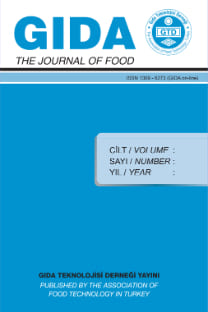Ülkemizde Üretilen bazı Üzüm Sirkelerinin Bileşimleri ve Gıda Mevzuatına Uygunlukları Üzerine bir Araştırma
Üzüm sirkesi, bileşim, metal-metaloit, mevzuat, kalite
A Research on The Determination of Compositions of Grape Vinegars Produced in Turkey and their Conformity to Food Legislation (Turkish with English Abstract)
Grape vinegar, composition, metal metalloid, legislation, quality,
- ISSN: 1300-3070
- Yayın Aralığı: Yılda 6 Sayı
- Başlangıç: 1976
- Yayıncı: Prof. Dr. İbrahim ÇAKIR
Süte farklı homejenizasyon basınçları uygulamanın ayran kalitesine etkisi
Balkır Tamuçay ÖZÜNLÜ, Celalettin KOÇAK
Yenilebilir Bitki ve Tohum Filizlerinin Fonksiyonel Özellikleri
Hasan YETİM, İsmet ÖZTÜRK, Fatih TÖRNÜK, Osman SAĞDIÇ, Mehmet HAYTA
Çiğ Süt ve Peynir Örneklerinden İzole Edilen Laktik Asit Bakterilerinin Antimikrobiyel Aktiviteleri
Evrim Güneş ALTUNTAŞ, Kamuran AYHAN, Gözde OKCU, Kübra ERKANLI, M. Havva BALCI, Ş. Selin SONAKIN
Kabuk Soyma Yöntemlerinin Havuç Kalitesine Etkisi (İngilizce)
Özlem AYDIN, Levent BAYINDIRLI, Nevzat ARTIK
Süte Farklı Homojenizasyon Basınçları Uygulamanın Ayran Kalitesine Etkisi
Balkır Tamuçay ÖZÜNLÜ, Celalettin KOÇAK
Kızılötesi ve Kızılötesi-Kombinasyon Isıtma Teknolojilerinin Gıda İşleme Uygulamalarında Kullanımı
Effects of different milk types and starter cultures on kefir
Mehmet Lütfü ÇAKMAKÇI, Aynur Gül KARAHAN, Zübeyde ÖNER
Polyphenols, alkaloids and antioxidant activity of different grades Turkish black tea
